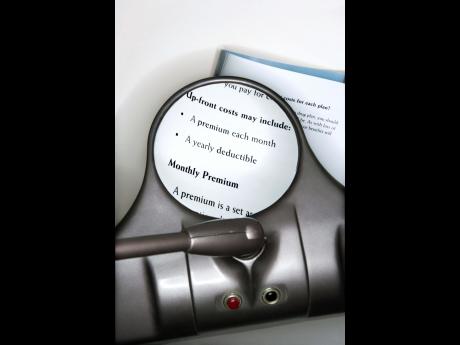Published:Sunday | April 3, 2016
Q: Many thanks for your article in The Sunday Gleaner of March 20, 2016 about GAP Insurance. I am actually in the process of purchasing my first motor vehicle and the information that you provided has opened up my insurance platter. What are some of the things that I should know as a prospective insurance buyer?
– M. B., Kingston 10
A: The question you posed has been asked many times, from the points of view of a first-time buyer or as a young driver who has had his/her first accident. Much the same way that smartphone users personalise their devices with a wide variety of wallpaper, apps (applications or programmes for those who are unfamiliar with the lingo) and skins to meet their individual lifestyles, I have tried to tailor my responses in the same manner. Insurers and brokers, unfortunately, still don’t get it. They use the one-size-fits-all, cookie cutter approach in spite of all of the evidence that suggests another method is more appropriate.
I will tackle your question from a different direction. There is a group of commercial insurance buyers in the United Kingdom. It is called AIRMIC. The abbreviation means Association of Insurance and Risk Managers in Industry & Commerce. Its members spend millions of pounds each year to buy insurance coverage. These officials who manage complex risks in different industries understand the nitty-gritty of insurance. In 2014, AIRMIC issued a report that was written after extensive research. It was prepared to help members make better decisions about insurance.
PURCHASE OF INSURANCE
The booklet has a very long title: Efficacy of Business Insurance – Guidance for insurance buyers on achieving greater coverage, contract and claims certainty. Even though it was written specially for buyers of business insurance, some of its general principles can also be applied to personal insurance transactions.
Some of the more relevant parts of the 58-page booklet are summarised below:
n Insurance is a very complex tool that helps consumers to manage risks.
n Individuals should carefully assess their insurance needs and consider the chances of something going wrong, not just the premium.
n The purchase of insurance requires the experience, skills and competencies of a buyer who has spent time to do his/her homework.
n The relationship between an insurer and a buyer is not a relationship among equals.
n The laws that govern how insurance operates were drafted primarily to protect the interests of insurers.
n An informed buyer has a very important role to play in making sure insurance functions as it should.
n Buyers should review their insurance contracts as soon as is possible after the purchase of coverage, paying particular attention to all issues relating to claims and how disputes will be handled. Seek clarification when necessary.
Some persons in the local insurance industry have criticised me over the years as being anti-insurance companies. This is unfortunate. I have always operated on the assumption that insurance contracts are weighted in favour of the insurers.
My mission has always been and will remain trying to use information to balance those scales. It is very gratifying to learn that the big and the powerful in the United Kingdom – for example, AIRMIC and the lawmakers in that country – share some of the views that I hold and, more important, are taking revolutionary steps to update the old-fashioned laws that govern how insurance is conducted.
n Cedric E. Stephens provides independent information and advice about the management of risks and insurance. For free information or counsel write to aegis@flowja.com




Leave A Comment